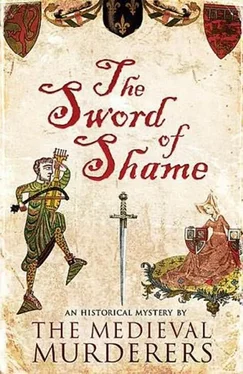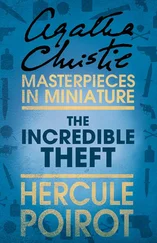The Medieval Murderers - Sword of Shame
Здесь есть возможность читать онлайн «The Medieval Murderers - Sword of Shame» весь текст электронной книги совершенно бесплатно (целиком полную версию без сокращений). В некоторых случаях можно слушать аудио, скачать через торрент в формате fb2 и присутствует краткое содержание. Жанр: Исторический детектив, на английском языке. Описание произведения, (предисловие) а так же отзывы посетителей доступны на портале библиотеки ЛибКат.
- Название:Sword of Shame
- Автор:
- Жанр:
- Год:неизвестен
- ISBN:нет данных
- Рейтинг книги:4 / 5. Голосов: 1
-
Избранное:Добавить в избранное
- Отзывы:
-
Ваша оценка:
- 80
- 1
- 2
- 3
- 4
- 5
Sword of Shame: краткое содержание, описание и аннотация
Предлагаем к чтению аннотацию, описание, краткое содержание или предисловие (зависит от того, что написал сам автор книги «Sword of Shame»). Если вы не нашли необходимую информацию о книге — напишите в комментариях, мы постараемся отыскать её.
Sword of Shame — читать онлайн бесплатно полную книгу (весь текст) целиком
Ниже представлен текст книги, разбитый по страницам. Система сохранения места последней прочитанной страницы, позволяет с удобством читать онлайн бесплатно книгу «Sword of Shame», без необходимости каждый раз заново искать на чём Вы остановились. Поставьте закладку, и сможете в любой момент перейти на страницу, на которой закончили чтение.
Интервал:
Закладка:
When the servant had left the room, Martha Haskell said, ‘Uncle, here is someone come to see you,’
Elias was wearing a white night-cap. His eyes were dark pools in a long-nosed face. All of this was fairly plain to see, for a pair of candles were burning in the recesses at either side of an intricately carved head-board. The whole scene made me think of a shrine or a tomb.
‘What have you brought me?’ he said.
‘Nothing.’
‘Nothing will come of nothing.’
‘I expect nothing, sir,’ I said, ‘since I find myself here under…false pretences.’
‘At least you admit it.’
The voice might have been thin but the mind behind it was sharp. Elias Haskell looked unwell but he did not have the appearance of someone on the verge of death.
‘This is Nicholas Revill, uncle,’ said Martha. ‘He’s a player. He took the wrong turning.’
Swiftly she explained the circumstances by which I’d arrived at the Haskell rather than the Maskell household. It made me appear foolish all over again, but I suppose I deserved it at least once more. I looked around the room in my discomfiture and moved nearer to the fireplace. I noticed that a large H, wreathed with fruits and foliage, was the central ornament in the chimney carvings. H for Haskell, presumably. Above the fireplace a great sword was displayed, while on either side of it there hung a tapestry. One tapestry depicted Judith holding up the decapitated head of Holofernes, while the other showed St Christopher carrying the Christ child on his back across the river. I looked towards the bed to see Elias smiling slightly.
‘A player, eh?’ he said. ‘I remember the old London playhouses. I remember the Red Lion.’
‘Before my time, sir,’ I said, but warming to him on account of his knowledge.
‘A player makes a change from the usual visitors.’
His tone was more welcoming than that of the other men in the household. Now I smiled back, in gratitude and to show that I bore him no ill will because he knew of my blunder. I felt more at ease. Someone touched my right knee. For an instant I thought it was Martha and wondered why she was stooping. I looked down. And almost threw myself into the open fire, in fear and surprise. As it was I found myself jammed up against the chimney-piece and holding out my hands to ward off any attack.
Crouched on the floor nearby and looking up at me was a wrinkled child. No, not a child, but a horrible, diminutive old man, with long arms and a bare head and great eyes.
But it was neither a child nor an old man. Rather it was a creature, one of which I had often heard but seen on only a single occasion. The beast wasn’t in the menagerie of the Tower, as you might expect, but in the company of a sailor on one of London’s wharfs. They’d appeared to be good friends, the sailor and his creature. So, after the first shock had subsided, I instinctively recognized this specimen for what it was.
‘You’ve taken his place by the fire,’ said Elias Haskell.
I couldn’t reply straightaway, I was still shaken, but I noticed that he was smiling more broadly now. Even Martha seemed amused.
‘Grant does not like the fire,’ she said, ‘because he singed his fur one day. But he thinks that the place in front of the fire is rightfully his. He resents anyone who stands where you’re standing.’
Grant? Hadn’t the stout man in the hall told me to convey their greetings to just such an individual? Who would have thought that Master Grant would turn out to be a monkey. I’d wondered at the gatehouse whether I was entering some private bedlam. It had been an idle thought. Now I began to consider whether I really had wandered into a madhouse. Either that or I was dreaming.
‘Where does he come from?’ I said for the sake of saying something. I continued to eye the monkey while he continued to gaze on me with his large eyes. He was crouched on his hind legs and with his forelegs-or arms, I suppose-scraping the floor. I was afraid that he might take it into his large, furrowed brow to leap up at me and fling his hairy arms around my neck. That was how I’d seen the sailor carrying his monkey on the London wharf, the man striding along, his face all brown and creased, with the beast clinging round his neck like a wizened child. They’d looked alike, the sailor-man and the monkey. I realized now where the musty smell in the room came from. It wasn’t so much the sick man in his bed or the unaired state of the chamber. It was this brown creature that crouched underfoot.
‘Grant came from Africa,’ said Elias. ‘He belonged to one of the fellows at a college in Cambridge, though I do not know how he came by him. The fellow was called Grant too. When the man died he left me the monkey.’
‘In God’s name, why?’ I said.
‘Because I once said to him that the creature had more sense in his head than a whole tribe of humans. Not just more sense but he is better-natured too. Grant the man was glad that I approved of Grant the monkey, while I was glad to take the monkey when his owner died. See what he can do.’
I turned aside to look, relieved that the monkey had shifted his ground. He was waving his arms above a pair of upturned pots set in a clear space on the rush-and herb-strewn floor. The pots were small, such as you might keep trinkets in. When he was sure I was watching him, he lifted up one of the pots. Nothing there. He lifted the other. Something glinted dully. I craned forward. It looked familiar. It was familiar. My hand flew to my doublet pocket. The copper buckle I’d removed from my shoe in case it was lost in the snow, the buckle in the shape of a love-knot, was gone. Whether it had fallen out or whether this monkey had somehow picked my pocket, I didn’t know, or care. I made to retrieve my property. At once, Grant started gibbering angrily and shifting on his haunches.
‘It’s his game,’ said Elias Haskell. ‘Let him be.’
I stood back, in a state that wasn’t amusement or anger or amazement, but some mixture of all three.
The monkey lumbered round so that he was hunched between me and the two pots. His long arms fiddled with the pots, sliding them around the floor. I knew what he was doing of course. I’ve seen similar tricks played by the coney-catchers on the London streets. So have you, I expect. Admittedly, the tricks are usually played out with three containers rather than two, but we must give the monkey some leeway. The coney-catcher waits for a country bumpkin to come along. He bets the bumpkin that he won’t be able to locate some small item hidden under one of three upturned goblets or coconut shells which are then shifted rapidly around. The bumpkin wins on the first couple of occasions and that encourages him to wager heavily on the third. Surprisingly, that’s the time he loses.
I’ve seen this trick performed on the Southwark streets by all manner of humans but I’ve never seen it carried out by a monkey. As it happened, the monkey wasn’t quite as adept as his human counterparts and I was able to glimpse which pot my buckle was secreted under as he shuffled them about. When he’d finished I pointed to that one. The mischievous beast deliberately lifted the other. Martha laughed. I felt annoyed, with her, with Grant the monkey, with myself. Fearing this might go on all night, I looked in despair at Elias Haskell.
The old man said, ‘I know what you’re thinking, player. But Grant does not outstay his welcome, unlike human beings. See.’
Elias snapped his thin fingers. The monkey swivelled his head towards the sound and then abandoned his upturned pots. He moved across the room with a queer, lolloping gait, like a man who can’t quite decide whether he’s going to walk or to crawl. In a dark corner on the far side of the chamber, I now saw, there stood a kind of large cage made out of wooden slats. The monkey called Grant entered the cage and pulled the door to after him. It was like a prisoner returning to his cell. Before he could think better of it, I picked up my copper buckle and put it back in my doublet.
Читать дальшеИнтервал:
Закладка:
Похожие книги на «Sword of Shame»
Представляем Вашему вниманию похожие книги на «Sword of Shame» списком для выбора. Мы отобрали схожую по названию и смыслу литературу в надежде предоставить читателям больше вариантов отыскать новые, интересные, ещё непрочитанные произведения.
Обсуждение, отзывы о книге «Sword of Shame» и просто собственные мнения читателей. Оставьте ваши комментарии, напишите, что Вы думаете о произведении, его смысле или главных героях. Укажите что конкретно понравилось, а что нет, и почему Вы так считаете.












